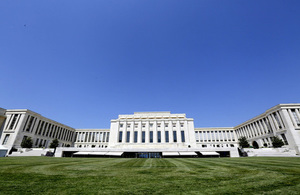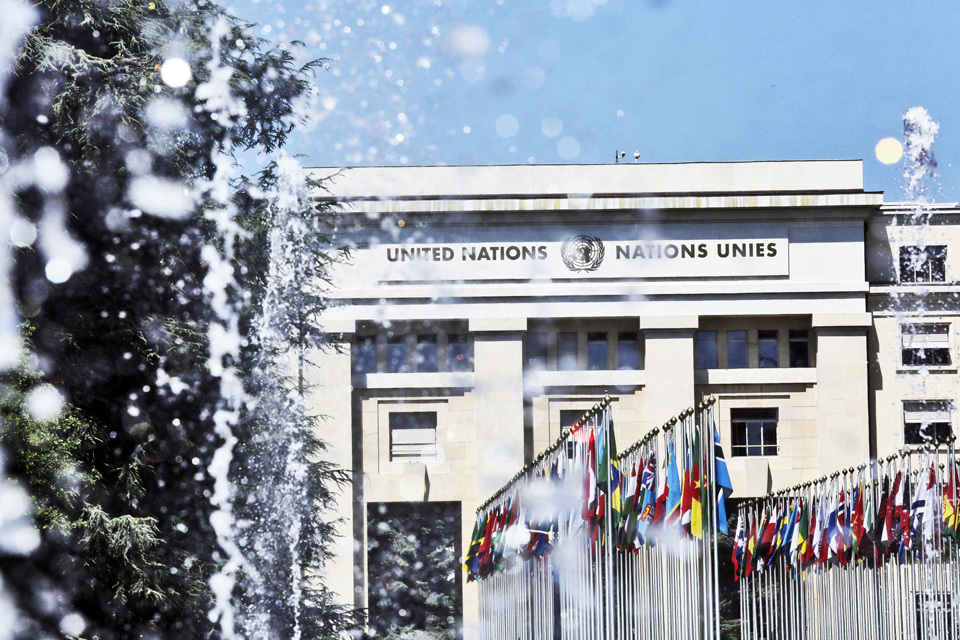UNCTAD Trade and Development Board: UK Statement on Trade and Development
Delivered during the UNCTAD Trade and Development Board on 14 September 2017.

The UNCTAD Trade and Development Board takes place at the Palais des Nations in Geneva
Let me begin by saying that the UK fully supports, and aligns itself with, the statement made on behalf of the European Union and its Member States.
In Nairobi, and at other meetings, we underlined that the UK greatly values UNCTAD’s role as a place to meet and discuss trade and development issues. We remain committed to ensuring that UNCTAD is an effective organisation that focusses on its core strengths of delivering high-quality analysis and research, sound policy advice and valuable technical assistance on the ground.
That is why we worked so hard at UNCTAD XIV to agree a new mandate, in the shape of the Nairobi Maafikiano, which will continue to ensure that UNCTAD will have the ability to deliver its critical expertise, and enable UNCTAD to implement the 2030 Agenda for Sustainable Development.
There is much valuable work that the organisation can do over the next four years, which will deliver real results whilst remaining firmly within its agreed mandate. One such area, where UNCTAD can play a particularly valuable role, is on assisting developing countries and Least Developed Countries in overcoming the digital divide. The UK believes that the Digital Economy, and e-commerce in particular, is an important driver of economic growth: access to the internet is estimated to have the potential to generate over $2.2 trillion in additional GDP and more than 140 million new jobs in the developing world. Therefore, the UK is proud to contribute financially towards the ‘e-Trade for All’ project and fully supports UNCTAD playing a leading role in developing the potential of the digital economy to create sustainable growth and jobs.
We commend the efforts made so far to implement robust results-based management procedures across the Secretariat’s work. The Nairobi Maafikiano underlines the importance of results-based management as a tool to achieve greater efficiency and effectiveness in realising UNCTAD’s objectives. We continue to strongly encourage UNCTAD to continue its series of management briefings on this issue.
We must all work harder to ensure that we shape a new era in which globalisation genuinely works for all. Together, we can shape a new approach to enhance the prosperity of citizens across the world.

The UNCTAD Trade and Development Board takes place at the Palais des Nations in Geneva
The UK remains fully committed to ensuring developing countries can reduce poverty through trading opportunities, including as we leave the European Union. On 25 June we announced that, as we leave the EU, we will secure existing duty-free access for the world’s poorest countries to UK markets, and will aim to maintain current access for other developing countries which benefit from reduced or zero tariffs.
As well as ensuring continued preferential access to the UK for developing countries, the UK will continue meet our commitment to spend 0.7% of Gross National Income on overseas development assistance. Our spending on aid for trade alone exceeds £1bn per year. The UK will continue to invest in assisting partners increase their trade and export driven economic growth, and help ensure that the benefits of such growth help to improve opportunities for those living in poverty.
At the heart of our approach is a desire for a more open global economy that creates jobs, promotes sustainable development, and improves living standards for everyone. Therefore, in the future, we will build on our track-record as a champion of trade and development, strengthening our existing support and seizing new opportunities to increase trade links through UNCTAD, the World Trade Organisation and other institutions. For this reason, we want to see UNCTAD thrive, focussing on its strengths and providing a forum where members can make positive contributions, to move the agenda forward, and to further the goals of the Maafikiano.